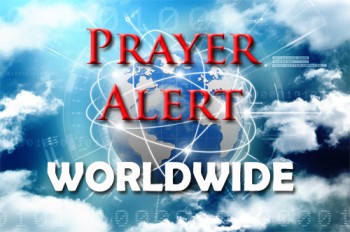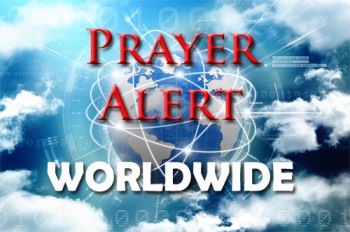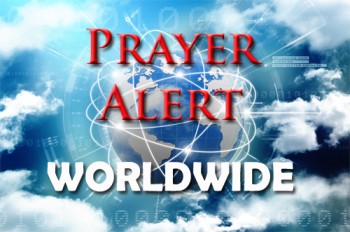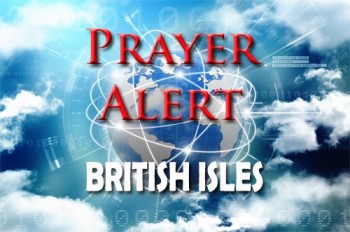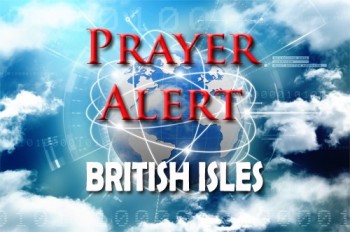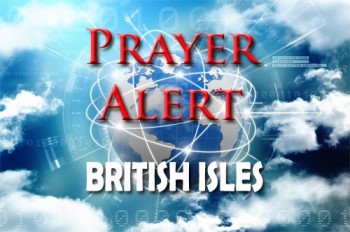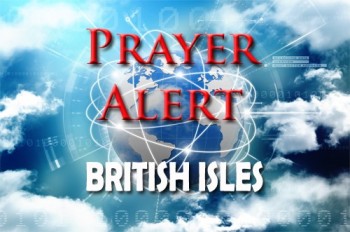
David Fletcher
David Fletcher is Prayer Alert’s Editor.
He is part of a voluntary team who research, proof-read and publish Prayer Alert each week.
If you would like to make a donation towards our running costs, please click here.
Three women, charged with 'inciting prostitution' for not wearing veils, have been sentenced to 42 years in prison between them. Now, with Covid-19 cases confirmed in prisons across Iran, they are in more danger than ever. Monireh, Yasaman and Mojgan have done nothing wrong; thousands are calling on the head of the judiciary to release them immediately. As an act of peaceful protest, the unveiled women handed out flowers to female passengers on a Tehran metro train. They were filmed sharing their hopes for Iranian women on International Women’s Day. Days after the video went viral on social media, they were charged with sham offences including ‘inciting prostitution’ for promoting unveiling. Prisoners in Iran are at particular risk because they are unable to take the same social distancing and hygiene measures as those outside prison to protect themselves.
More than five years of conflict have left Yemenis hanging on by a thread, their economy in tatters, and their institutions facing near-collapse. The UN chief told a virtual pledging conference they needed to demonstrate solidarity with some of the world’s poorest and most vulnerable in Yemen. Pray for UN workers to receive the funding to meet people’s needs in this staggering humanitarian crisis. Across the globe Covid-19 has halted economic activity and threatens social wellbeing. UNESCO says it is now coping with millions in extreme poverty. Pray for the UN to make wise decisions as it addresses the pandemic and mobilises the resources needed for a proactive recovery. In Africa it is addressing the ‘appalling impact’ of Covid-19 on minorities; the virus has a ‘disproportionate impact’ on racial and ethnic minorities, including people of African descent. Pray for human rights to be at the centre of coronavirus response.
Thousands have been killed amid ‘near impunity’ for offenders in the war on illegal drugs since 2016, the UN says. Its report levelled heavy criticism at President Rodrigo Duterte's government. His crackdown has been marked by high-level rhetoric that can be seen as ‘permission to kill’. Official figures show more than 8,000 people killed since he took office: other estimates put the figure three times as high. Most victims are young poor urban males, and police, who do not need search or arrest warrants to conduct house raids, systematically force suspects to make self-incriminating statements or risk facing lethal force. Duterte described the report as ‘a travesty’. Despite the many killings he remains very popular.
Kenya's government closed all churches in order to prevent further spread of coronavirus. So Rev Paul Macharia from All Saints' Cathedral has taken church services on the road. They travel to apartment blocks and provide sermons and music from the street below; allowing people to attend church while being able to maintain social distancing rules to tackle the new pandemic. This government-approved safe service is nicknamed B2B, ‘Balcony to Balcony’, taking place every Sunday, using amplifiers and loudspeakers. It has become popular, with large turnouts of families on their balconies.
Christians around the world will participate in a global outreach on Pentecost Sunday, 31 May, with the goal of sharing the Gospel with one billion people. The ambitious effort is an offshoot of Global Outreach Day, ‘GO2020,’, aiming to spark waves of new disciples as the very first Pentecost did two thousand years ago. The focus goes beyond salvation. Organisers are also asking for God to intervene in the midst of the pandemic crisis. With so many struggling with the instability, they believe the time is ripe to share the message of Christ and reap a harvest of souls. They will meet their goal of sharing the gospel with one billion people if every Christian reaches just five people in his or her social circle.
Praise God for a successful rescue operation of 360 children, women and men freed from a brick kiln. They had been made to work under debt bondage for the last six months and faced extreme violence when they asked to leave during the COVID-19 pandemic. IJM and its partner supported local officials in the operation to get them finally to safety. This is the third time in five years that authorities have rescued people from this same brick kiln, but in the past the owner has always been released on bail.
England has seen a 36% increase in homeless under-25s seeking support since lockdown began. Youth charities in Wales and Northern Ireland have a 50% increase. Charities and youths say some councils are failing them during the Covid-19 crisis. ‘Stay at home, protect the NHS, save lives.’ But what if you don’t have a home? ‘Your grandparents were called to war, you were called to sit on the sofa,’ is a saying. But what happens if other people’s sofas are the only thing keeping you off the streets? For many homeless young people, sofa surfing is the only way of keeping a roof over their heads, staying with different friends for days or weeks at a time, while they seek support and work out their next move. The government has stopped landlords evicting tenants until the end of June. There is no protection against being thrown out by parents or friends.
The URC has said Dominic Cummings should ‘consider his position’ following his account of his 260-mile trip to his parents’ farm when he and his wife were ill, despite government advice to stay at home, especially if you had coronavirus. It said his actions were a blow to trust and integrity. ‘Dominic Cummings’ explanation of his actions shows how important it is to maintain a clear sense of what is right and wrong, along with the ability to be sorry for mistakes made; none of which he displayed. Trust is built on integrity and his actions have been a blow to both.’ Some bishops have received death threats after commenting on Cummings. The Bishop of Worcester was warned, ‘Stay out of politics or we’ll kill you’. The Bishop of Ripon was told, ‘Stay out of politics or it will be the death of you’. The Bishops of Newcastle and Liverpool also received hate mail. See
Home should be the safest place. But for child victims of online sexual exploitation, it is far from safe. Lockdown has meant being locked in with their abusers, with no way to escape. As you read this, western predators from the UK are paying to livestream the sexual exploitation of children from the Philippines. Tragically, this vile crime is growing. In almost two thirds of cases in the Philippines, children are abused by their own families - like Maarko, who, aged just seven, became a victim performing ‘shows’ for sex offenders in the UK to watch. The pandemic creates a perfect storm for increased child sexual exploitation online. Children are locked in with their abusers, and western predators are at home with more time to spend online. Global law enforcement is reporting that child sexual abuse sites are crashing due to increased demand during lockdown.
280,000 social care workers are in insecure and low-paid work, leaving them vulnerable to Covid-19. A petition has been launched appealing for Matthew Hancock to provide funding so that all social care sector staff can be paid the Real Living Wage of £10.75 an hour in London and £9.30 in the rest of the UK. Dr John Sentamu said, ‘It is morally wrong to put our care workers on the front line in the face of infection and potential death, with limited personal protective equipment, and to do that for poverty pay. I hope that if this epidemic teaches us anything, it will be to draw us back to justice, compassion and love. That is why I am proud to support the campaign for the Government to prioritise the proper funding of social care, ensuring that every care worker will get paid a Real Living Wage.’

